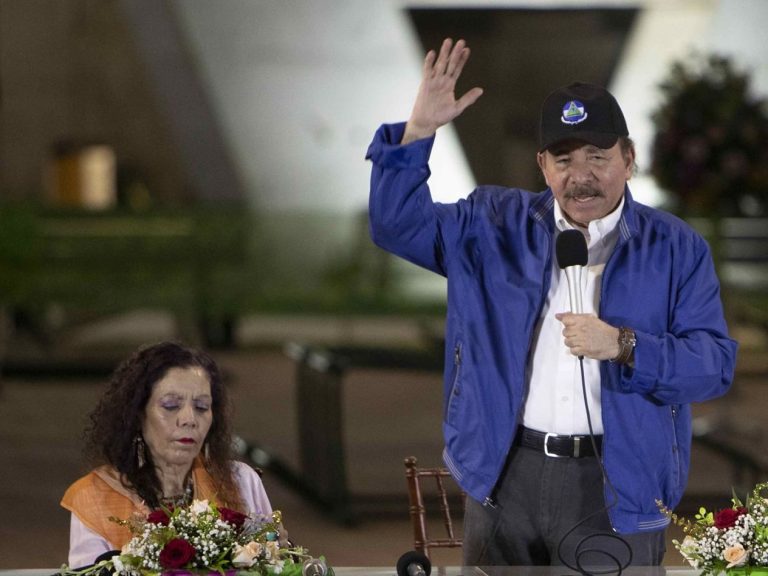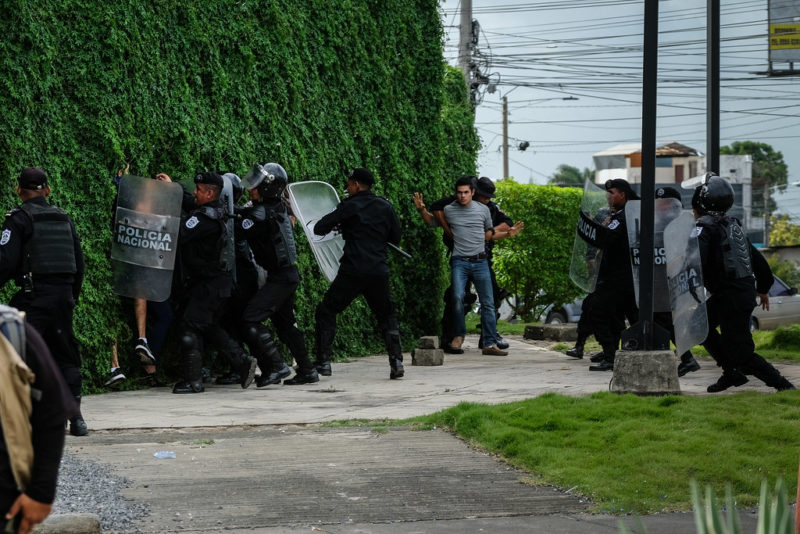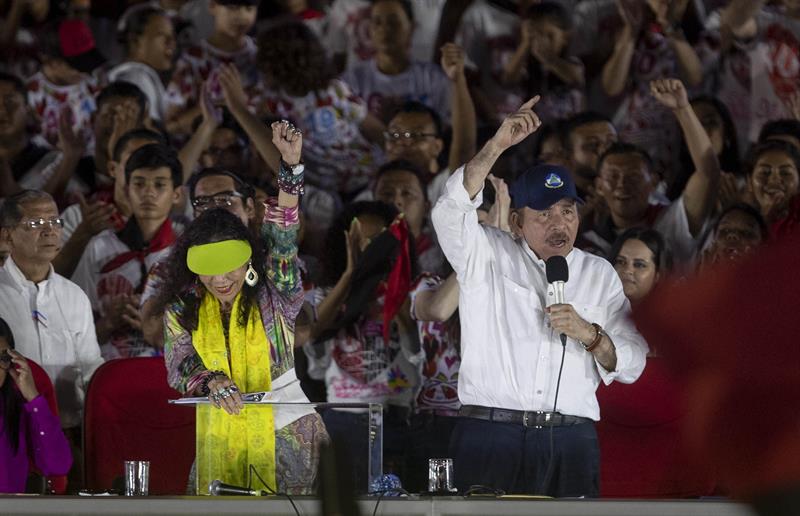23 de octubre 2019

Children of Exile: The Births “Sowing Hope” in the Camp of Nicaraguan Farmers

PUBLICIDAD 1M
PUBLICIDAD 4D
PUBLICIDAD 5D
Ortega is an isolated figure within Latin America, North America and Europe. His support has been reduced to the Cuba-Venezuela alliance

President Daniel Ortega launched into a furious attack on the European Union and its head of diplomacy Josep Borrell. His remarks occurred on October 17, during a ceremony for the presentation of diplomatic credentials for foreign ambassadors in Nicaragua, among them that of the European Union and the representatives from several member states, including Germany, Austria, Italy and Finland.
At first glance, it would seem to go against all logic for a chief of state to insult the diplomats that he’s receiving in his country with the purpose of broadening relations of mutual benefit. However, this has been a habitual practice of Ortega’s since returning to power in 2007.
What we saw on the official television channels is a scene repeated again and again. In it, a vociferous comandante reenacts the part of little David against the imperialist Goliath of the eighties, for the consumption of his supporters.
The purpose – as his wife, spokesperson and vice president, Rosario Murillo, would later explain in her daily monologue on “what our president wanted to say” – is to keep the recently arrived ambassadors at bay and impose the rules of “respect” through threats, but without ever arriving at the point of a rupture in diplomatic relations. “A beggar with a club”, as the popular saying goes, describes perfectly the theatrical production of Ortega-Murillo that culminates in a demand to pay the debts of colonialism and even a million-dollar kickback in the 21st century itself for the merit of being an unrepentant violator of human rights.
Since 2008, on the eve of that year’s municipal electoral fraud, Ortega has substituted political intimidation for diplomacy. We witnessed this when he unleashed his misogyny against Francesca Mosca, EU ambassador, and classified the European governments as “flies buzzing around filth”. During this same period, his assistant foreign minister, Manuel Coronel Kautz, called the Swedish Social Democratic ambassador Eva Zettergerg “a devil”, and the mobs of his supporters surrounded the embassy to demand that she be lynched as “an aborter”.

The police violently detain two youth near the “Las Flores” Café, along the Masaya highway. Photo: Carlos Herrera.
Nevertheless, Ortega has always played a political game of calculated risks with the United States and the European Union. He challenged them when he could allow himself the luxury of filling the vacuum of the suspended European aid and the Millennium Challenge Account from the U.S., with the billions in funds from the Venezuelan cooperation that he could manage at his own discretion.
A decade later, his bases of support have drastically weakened. The epoch of the fat cows from the Venezuelan oil money ended in 2016, and the economic alliance with the large companies that granted him political legitimacy to govern without democracy ruptured after the killings of April 2018.
Outside the continent, despite his courtship of Putin and the latter’s proclamation that Nicaragua is the best friend of Russia’s client states Ossetia and South Abkhazia, Moscow’s strategic interest is limited to installing a continental espionage post in Managua. The wager on an inter-oceanic canal with China also failed with the farmers’ protests against the tycoon Wang Jing’s project, and Ortega has had to content himself with the perks from Taiwan and his toxic alignment with Iran and North Korea.
More than eighteen months since the April rebellion, the dictator’s diplomacy has left him isolated with Latin America, North America and Europe. He lacks any effective support beyond the continent. Ortega’s regime has been accused of crimes against humanity in three international human rights reports: from the IACHR, the UN and the GIEI. Further, following the failure of two national dialogues, he faces an ongoing process in the OAS for violating the Inter-American Democratic Charter.
On July 19, 2018, Ortega premiered the narrative of “a failed coup d’etat attempt”, accusing the bishops of the Episcopal Conference – who at his request organized the first national dialogue -of being “coup supporters”. Since then, he’s blown up all his bridges in Nicaragua and in the international community. He expelled the OAS Commission for Human Rights, the UN’s Human Rights Reporter, and the Inter-Disciplinary Group of Independent Experts. He failed to follow through on the accords reached with the Civic Alliance during the second national dialogue, facilitated by the large business leaders, and he declared an end to that dialogue process. He refused to recognize the OAS Working Group and the High-Level Commission of five countries, and he recently cut off all contact with the OAS General Secretariat, with which he was to have reached an accord on electoral reforms.

“Comandante” Daniel Ortega speaking before his sympathizers during the commemoration of the 40th anniversary of the Sandinista revolution. Jorge Torres / EFE
Ortega’s bases of support today have been reduced to the alliance with Cuba and Venezuela – an ideological alliance of three countries in political and economic bankruptcy. In this, he has subordinated his pragmatism to the regional strategy that operates at Venezuela’s rhythm. If Maduro should cede, weaken or collapse, Ortega will act with flexibility and pragmatism; but while Maduro consolidates his dictatorship and refuses to engage in dialogue with the Venezuelan opposition, Ortega closes himself in still more, without making any democratic concessions. And despite the setback to the national economy and the threat of external sanctions, Ortega will not open himself up to a deep political negotiation while Maduro strengthens himself in power.
Ortega won’t negotiate a political way out unless national and international pressure, exercised at its highest level and simultaneously, should place him at the edge of a cliff and the political fissures that already exist in his regime among the civilian and military public employees and within the Sandinista Front itself, should become large cracks. His final goal has never been to promote democratic reforms nor free elections in 2021, but to maintain himself in power at all costs, including after 2021 as part of the survival scheme of the alliance led by the long-lived authoritarian Cuban model.
By burying the hope of political negotiations, Ortega has led his regime to a point of no return. Up ahead, they face a crossroads with two possible paths. One leads them to follow the steps of Nicolas Maduro and call for a Constituent assembly to prolong his mandate and cancel the 2021 presidential elections. The other would consist in fabricating an electoral reform with some lesser allied parties instead of seeking a consensus with the Civic Alliance, to hold non-competitive elections in 2021. Such a path would exclude the blue and white opposition that represents the country’s new political majority.
In both cases, he would run a political risk that up until now he’s never been willing to adopt, that of losing diplomatic recognition for his government from the international community headed by the OAS. Will Ortega dare to make the final leap into the vacuum?
These are the dilemmas of the tyrant in his solitude. Meanwhile, the blue and white opposition’s only option is to exercise more civic pressure, until they achieve the suspension of the state of siege. They could then forge a great national, democratic and inclusive alliance and constitute an alternative power to accelerate the political departure of a regime that, despite the threats and the repression, is experiencing a terminal political crisis.
Archivado como:
PUBLICIDAD 3M
Periodista nicaragüense, exiliado en Costa Rica. Fundador y director de Confidencial y Esta Semana. Miembro del Consejo Rector de la Fundación Gabo. Ha sido Knight Fellow en la Universidad de Stanford (1997-1998) y profesor visitante en la Maestría de Periodismo de la Universidad de Berkeley, California (1998-1999). En mayo 2009, obtuvo el Premio a la Libertad de Expresión en Iberoamérica, de Casa América Cataluña (España). En octubre de 2010 recibió el Premio Maria Moors Cabot de la Escuela de Periodismo de la Universidad de Columbia en Nueva York. En 2021 obtuvo el Premio Ortega y Gasset por su trayectoria periodística.
PUBLICIDAD 3D